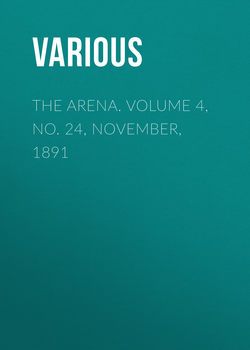Читать книгу The Arena. Volume 4, No. 24, November, 1891 - Various - Страница 4
BISMARCK IN THE GERMAN PARLIAMENT
II
ОглавлениеBismarck was on his guard against Frederick the Good, from whom a progressive policy was expected on account of his philosophical ideas, and a liberal and parliamentary government on account of the domestic influences which surrounded him. Knowing the humanitarian tendencies which sparkled in his disappointed mind, and the ascendency exercised over his diseased heart by the loved Empress Victoria, Bismarck availed himself of the terrible infirmity with which implacable fate afflicted the second Lutheran Emperor of Germany, and retained the imperial power in his own person, as though William I. were not dead. The enormous corpse of the latter, like that of Frederick Barbarossa, made a subject for analogous legends by German tradition, was replaced by another corpse, and in the decomposition consequent to his frightful infirmity, the unfortunate Frederick III. seems to have realized the title of a celebrated Spanish drama, “To Govern After Death” (Reinar Despues de Morir). All that he could do, when already ravaged by cancer, when the microbes of a terrible disease, like the worms of the sepulchre, were attacking and destroying him, was to open up a vista to timid hope, and to publish certain promises animated by an exalted humaneness, in spite of and unknown to the Chancellor who was not consulted in these declarations, which might be said to have descended from heaven on the wings of the angel of death. Bismarck went to and fro among the doctors, who naturally refused to declare the terrible disease mortal, and prepared to vanquish the moribund will of Frederick and the British notions of his widow, fearing that when the last breath of the imperial life had ceased the whole policy of Germany would have to be changed, as a scene in a theatre must be changed if it has been hissed. It was certain that there was as great a difference between the ideas of the Emperor William I. and those of Frederick III., separated by so brief a space, as between those of the Emperor Frederick Barbarossa and those of the Emperor Frederick II., his successor, after the long period of two hundred years had changed the capital features of the Middle Ages; the first was an unalloyed Catholic, notwithstanding his dissidences with the Guelph cities, and even with the Pope a stern Cæsar, like the good Roman Cæsars in time of war and defence, a veritable orthodox crusader, whose piety was concealed as in a colossal mountain whence he awaited the reconquest of outraged Jerusalem by the Christians; whereas the second was an almost Pantheistic poet and philosopher, whose Catholicity was mingled with Orientalism, who was equally given to the discussion of theological and of scientific questions, who followed the crusades in fulfilment of an hereditary tradition, who penetrated into the Basilica of the Holy Sepulchre by virtue of an extraordinary covenant with the infidel, and whose own beliefs were so cosmopolitan that they brought down a sentence of excommunication upon himself and of interdiction upon his kingdom. To Pope Innocent III., the former typified the Catholic emperor of the Middle Ages; Frederick II. appeared to him very much the same as in our days the Lutheran emperor appeared to Prince Bismarck, who took every possible precaution against the humanitarianism and parliamentarism of his dying pupil, and at the same time impelled his eldest son, the next heir to the crown, with all his influence and advice towards absolutist principles and reactionary propensities. No upright mind can ever forget the terrible desecration committed when, a few days before the death of his father, young William spoke of the empire as of a possession which it was to be understood he had already entered upon, and awarded the arm and head of his iron Chancellor the title of arm and head connatural with the Cæsarian institution. I know of no statesman in history who has given, under analogous circumstances, such proof of want of foresight as was given by Bismarck, comprehensible only if the body could assume the authority of the will, as did his, and if the intelligence could disappear, as did his, in an hydropic and unquenchable desire for power. Frederick, holding progressive ideas opposed to those of Bismarck and of William, would have greatly considered public opinion, and on account of that consideration would have perhaps respected, till the hour of his death, the Pilot, who, dejected by the new direction of public government, inferred that irreparable evil must result therefrom. When Maurice of Saxony trod on the heels of Charles V., whom he had defeated at Innsbruck, he was asked why he did not capture so rich a booty, and replied: “Where should I find a cage large enough for such a big bird?” Assuredly the conscience and mind of such a parliamentarian and philosopher as was Frederick III., must have addressed to him a similar question when he inwardly meditated sacrificing the Chancellor’s person and prescinding his power: “Where should I find a place outside the government for such a man, who would struggle under bolts and chains, making the whole state tremble in sympathy with his own agitation?” The experience and talent of Frederick, together with his respect for public opinion, led him to retain Bismarck at his post, subject only to some slight restrictions. But the Chancellor, in his shortsightedness, filled young William’s head with absolutist ideas; spurred and excited him to display impatience with his poor father; and when thus nurtured, his ward opened his mouth to satisfy his appetite, he swallowed up the Chancellor as a wild beast devours a keeper.
